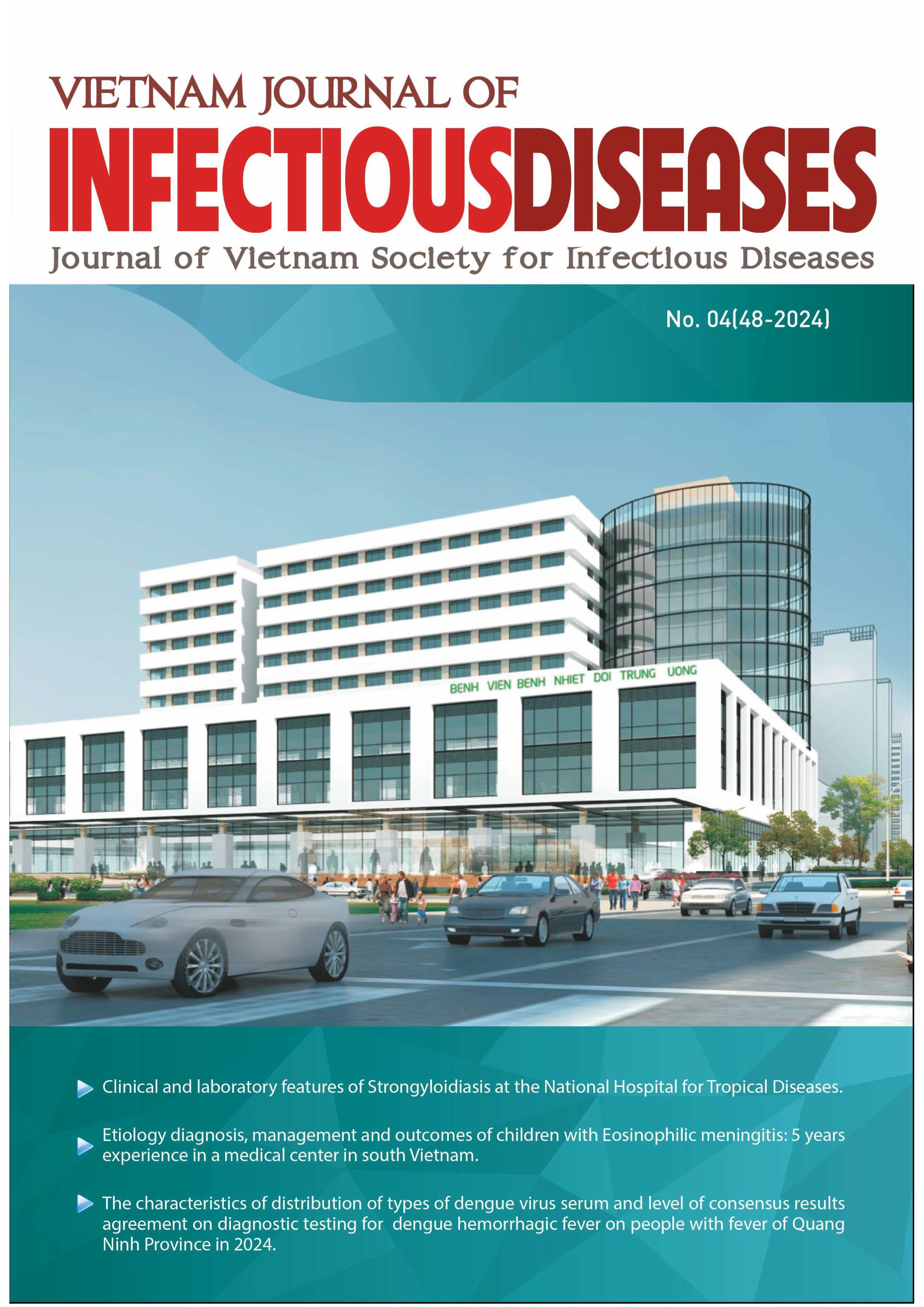REALITY DATA ON THE USE AND EFFECTIVENESS OF CEFTAZIDIME - AVIBACTAM
Nội dung chính của bài viết
Tóm tắt
Ceftazidime - avibactam (CAZ-AVI), a novel cephalosporin, has proven activity against multidrugresistant Enterobacterales and P. aeruginosa, and it has only been used in Vietnam in recent years.
Objectives: This study aimed to describe the usage pattern and treatment effectiveness of CAZ-AVI.
Subjects and methods: A retrospective observational study was conducted at Vinmec Times City International Hospital. Adult patients treated with CAZ-AVI for more than 48 hours from September 2021 to June 2023 were enrolled. Data on clinical characteristics, microbiology, and antibiotic regimens were collected, and outcomes such as microbiological and clinical effectiveness were analyzed.
Results: A total of 61 patients were included, with an average age of 64.9 years, and 78.7% were male. All patients had at least one risk factor for multidrug-esistant Gram-negative bacteria. The most common infections were pneumonia (54%), urinary tract infections (20%), and abdominal infections (15%). Septic shock occurred in 16% of patients. Out of 61 patients, 39 (63.9%) had positive culture, yielding a total of 51 isolates, primarily Klebsiella pneumoniae (45.1%) and Pseudomonas aeruginosa (21.5%). Carbapenem and CAZ-AVI resistance rates among Gram-negative bacteria were 86.7% and 48.8%, respectively. Among the 36 carbapenem-resistant strains tested for sensitivity to CAZ-AVI, the resistance rate was 58.3%. CAZ-AVI was used empirically in 37.7% of cases, and combination therapy was employed in 65.6% of patients to treat multi drug resistant isolates. The most commonly used antibiotics in combination therapy were aminoglycosides, tigecycline, fluoroquinolones, and colistin. The average duration of treatment was 10.7 ± 5.2 days.
Overall, microbiological cure was achieved in 38.5% of cases, while 43.6% experienced microbiological failure. Clinical improvement was observed in 77% of patients, and the 30-day mortality rate was 16.4%. There were no significant differences in microbiological or clinical outcomes between patients with ceftazidime-avibactam-resistant and -sensitive isolates.
Conclusions: This study provides important real-world evidence on the use and effectiveness of CAZAVI in treating infections caused by multidrug-resistant Gram-negative bacteria. Despite high resistance rates, the drug showed promising clinical improvement, though microbiological failure remains a concern.
Chi tiết bài viết
Từ khóa
Ceftazidim-avibactam, multidrug-resistant, gram-negative, infection, real-world evidence
Tài liệu tham khảo
2020;32(1):52-62.
2. Gales AC, Carmargo LFA, Cuba GT, et al. A review of real-world use of ceftazidime-avibactam for multidrug-resistant gram-negative bacterial
infections. J Infect Dis Ther. 2022;10:483.
3. Jorgensen SCJ, Trinh TD, Zasowski EJ, et al. Realworld experience with ceftazidime-avibactam for multidrug-resistant Gram-negative bacterial infections. Open Forum Infect Dis. 2019;6(12):ofz 522.
4. Mendes RE et al. Molecular beta-lactamase characterization of Gram-negative pathogens recovered from patients enrolled in the ceftazidimeavibactam phase 3 trials (RECAPTURE 1 and 2) for complicated urinary tract infections: efficacies analysed against susceptible and resistant subsets. Int J Antimicrob Agents. 2018;52(2): 287-92.
5. Shields RK et al. Clinical Outcomes, Drug Toxicity, and Emergence of CAZ-AVI Resistance Among Patients Treated for Carbapenem-Resistant
Enterobacteriaceae Infections. Clin Infect Dis. 2016 Dec 15;63(12):1615-1618.
6. Soriano A et al. The Use and Effectiveness of CAZ-AVI in Real-World Clinical Practice: EZTEAM Study. Infect Dis Ther. 2023 Mar;12(3):891-917.
7. Torres A, Zhong N, Pachl J, et al. Ceftazidimeavibactam versus meropenem in nosocomial pneumonia, including ventilator-associated
pneumonia (REPROVE): a randomised, doubleblind, phase 3 non-inferiority trial. Lancet Infect Dis. 2018;18(3): 285-95.


